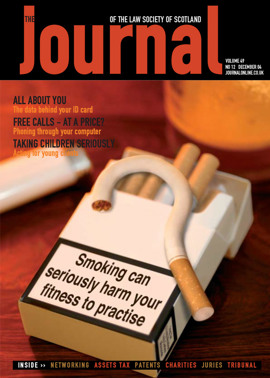A defining era

The overall objective of the bill is said to be “to ensure there is a robust, proportionate and transparent regulatory framework that satisfies public interest in the effective regulation of charities in Scotland and meets the needs of the Scottish charity sector”. Key reforms are to create a publicly available charity register which is authoritative, accurate and provides the necessary level of information about governance and finances; a dedicated charity tribunal to provide a simple and freely available means of questioning decisions of the Office of the Scottish Charity Regulator (OSCR) without recourse to the courts; and to set out clearly and explicitly the responsibilities of “charity trustees”, or “charity stewards” as the draft bill termed them.
Problems of definition
Perhaps the most important task of this bill is to define what constitutes a charity. This is also being addressed by Westminster in its Charities Bill. The definition of charity is very important because it links to the tax reliefs which charities receive from the Inland Revenue. As a UK department, the Inland Revenue is obliged to follow the same definition for tax purposes across the UK. For this reason, to avoid a dislocation where different definitions of charity north and south of the border lead to differing access to UK tax reliefs, the policy approach is to define charity in a way that is compatible with the Home Office’s proposals. The hope is that the Inland Revenue will accept OSCR’s decisions on charitable status as long as the definitions used in Scotland and the rest of the UK are not widely different. Has the Scottish Executive delivered in these key areas?
The re-definition of what constitutes a “charity” is a delicate task which requires precision because careless re-definition could easily result in the unintended exclusion of some bodies which are currently charities. The present law is an unusual creation which has applied in Scotland since at least 1891 and, although it has its faults, it has created a diverse and thriving UK charitable sector. At present the same rules determine what constitutes a “charity” in both Scotland and England and Wales.
The Westminster and Scottish bills are superficially similar. Both bills adopt a two part test which requires that a charity’s purposes: (1) fall within one or more of 13 categories (12 in England); and (2) satisfy a public benefit test. There any resemblance ends. There is now emerging a very considerable difference in the treatment of what constitutes “public benefit”. England will retain the flexibility of the common law. Scotland will have some statutory guidance in the form of what are called “criteria”, which are loosely based on the common law. Time will tell what practical effect this will have.
It is however clear that the charitable purposes forming the first part of both charity tests are expressed in narrower terms in the Scottish bill. If the recommendations for the Westminster bill by the Joint Committee of the House of Lords and House of Commons are adopted, the difference will become greater still. There are good reasons for the Joint Committee’s concerns over that bill. The policy statement which accompanies the bill indicates that although the proposed new purposes cover the great majority of purposes that are recognised as charitable under the current law, they do not cover everything. The committee proposes amendments to avoid stranding charities omitted by the new definition. There are two further safeguards to avoid this disaster. Any purposes which are not specifically covered by the new statutory definition but which are recognised as charitable purposes under the existing law will remain charitable purposes under English law and, in addition, the charitable status of all existing charities is specifically retained.
The Scottish bill does neither of these things. It provides for the transfer of all existing charities on to the new Scottish Charity Register, but that is only a halfway house. If, on inspection by OSCR, a charity does not satisfy the new charity test it will lose its charitable status. The Scottish definition, starting with the same pool of existing charitable purposes, is narrower than the English and does not have the benefit of the safety nets which will exist there. If the English consultation paper can state with certainty that the English categories do not cover all of the purposes currently recognised as charitable, there is an even more acute problem with the Scottish definition. Unless the intention is to exclude some existing charities, a new Scottish definition must somehow bridge the gap.
So, how does the Scottish bill attempt to do this? Clause 97 provides that Scottish Ministers may make such further savings provisions as are expedient and may particularly “provide that a body specified in the order, or a body of such type as may be so specified, may, despite not being entered in the Register, refer to itself as a ‘charity’ for such period as may be so specified”. This indicates uncertainty as to whether the proposed definition actually does the job, which is not surprising as it is universally accepted that the state of knowledge about the Scottish charitable sector is so lacking that we cannot identify accurately the number of charities in Scotland, never mind the details of their purposes. That might be a reason for taking the route of the English safety nets, but instead this clause appears to permit Scottish Ministers to change the definition of “charity” after the parliament has decided the matter. Quite apart from the questions of whether this is appropriate and whether it can truly be said to be the exercise of a delegated power, one wonders on what criteria Ministers might exercise this function.Charity trustees are unpaid volunteers running charities in their spare time. Clause 65 contains their new responsibilities and begins by restating their general duties, although it should be noted that clause 65(1)(b) goes on to impose a new standard of care by requiring that charity trustees “act with the care and diligence that it is reasonable to expect of a person who is managing the affairs of another person”. The real issue is, however, to be found in clause 65(2). This provides “The charity trustees of a charity must ensure that the charity complies with any direction, requirement, notice or duty imposed on it by virtue of this Act.” This formulation amounts to strict liability. Clause 65(4) goes on to provide that any breach of the duties imposed by clause 65(2) is to be treated as being misconduct in the administration of a charity. Clause 65(5) provides that it may also be a criminal offence. One of the failures which would warrant criminal proceedings would be failure to advise OSCR of a range of matters, one of which is a change to the charity’s name. There is no distinction between those who do this inadvertently and to no real detriment and those who intend to benefit themselves or to defraud. Both are, it seems, to be regarded as equally culpable.
Excluding the inclusive approach
Clauses 70 to 77 detail the appeals system. This comprises, first, internal review by OSCR and thereafter appeal to the Scottish Charity Appeals Panel. The persons who have a right to request these reviews are very strictly limited to either the charity or the person in respect of whom the decision was made, depending upon the type of order pronounced. Thus, if an individual is suspended from his role with the charity, only he would have a right of appeal. No one else would have a right to be heard. The Scottish provisions seem inadequate when compared with the Westminster proposals which permit an appeal by any person who is or may be affected by the decision. However, even this inclusive approach was felt by the Westminster Joint Committee to be insufficient. They have recommended that the remit of the English tribunal be widened further to cover every decision or non-decision of the Charity Commission, and to empower the tribunal to award compensation to charities. The new Scottish proposals do not compare well even with the present provisions. Should OSCR take action in the Court of Session under the present legislation any party who can show an interest in the proceedings will be heard by the court.
This bill creates a regulator with great powers. It fails to balance that power by allowing all of those potentially affected by the decisions of OSCR full access to an appeal process, as has been done in England and Wales. It seems perverse to create a specialist charity tribunal, only for access to be restricted in a manner which is nowhere justified.
It is increasingly difficult for charities to attract people willing to undertake the onerous role of charity trustee. They already face heavy civil sanctions and front page publicity as a result of action by OSCR. If such persons are fully advised of their new responsibilities, are they likely to undertake them? The standard demanded by clause 65(2) admits of no excuse despite the criminal penalties. It seems to me that this standard is much too demanding of volunteer charity trustees and is likely only to deter. That would have a severe and unnecessary effect on the sector. There are less oppressive ways of achieving the necessary control.
One of the themes of the consultation process over several years has been the need for OSCR to be seen to be independent of political control and influence. Part of this concern relates to the fact that charities often criticise government and campaign vociferously. OSCR has been at pains to point out that it will be “independent, proportionate, accountable, transparent and consistent” in the execution of its functions. Politicians are not, however, required to exhibit such behaviours in the performance of their functions and therein lies the source of the concern about politicisation of the regulatory process. Clause 97 compromises OSCR’s ability to determine charitable status and taints the regulatory process by allowing the possibility of political interference. It does not assist lawyers in advising what is to be regarded as a charity in Scotland because of its complete unpredictability and subjectivity. It may also be open to question how the Inland Revenue will view this.
Clause 97 also has implications for another key reform. The Scottish Charity Register is intended to be a complete list of all bodies eligible to operate as charities in Scotland. That is the justification for requiring charities registered with the Charity Commissioners, which are already thoroughly regulated, to register with OSCR. Clause 97 damages the authority of the register by creating two new categories of charities, namely charities which are charities but do not appear on the register (to be called, perhaps, “off-register charities”) and temporary charities which also are not on the register.
There are serious flaws in the Scottish Executive’s approach to these issues which require reconsideration if the bill is to succeed in its stated aims.
Anne Swarbrick is an associate of Anderson Strathern, Edinburgh and is an accredited charity law specialist. She was legal adviser to the Scottish Charities Office and thereafter Head of Investigations at OSCR.
In this issue
- Dear Father Christmas
- The stupidest in the world?
- No butts, no doubts, no regrets
- Bigger Brother
- Born to instruct
- Caught in the net
- A defining era
- 12 tips for Christmas networking
- Phoning for nothing and your clicks for free
- Be prepared
- Some fine tuning
- Brave new world
- Are all bets off for BHB?
- Clash of the Conventions
- Scottish Solicitors' Discipline Tribunal
- Website reviews
- Book reviews
- Farming right to buy






